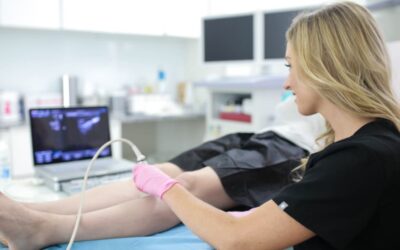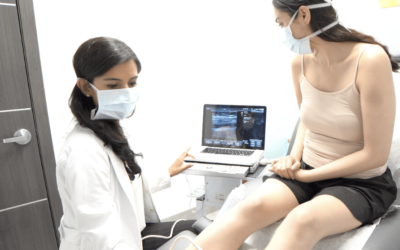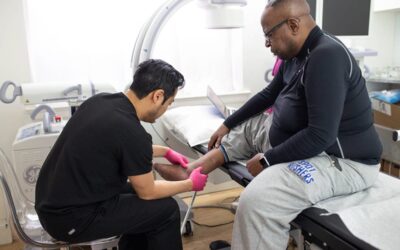When Should I Be Concerned About Leg Swelling?
Leg swelling or edema is a common occurrence and often not a cause for concern. However, there are times when leg swelling could indicate a more serious underlying condition. As board-certified vein doctors, we understand the importance of diagnosing and treating the root cause of leg swelling. In this article, we will discuss when you should be concerned about leg swelling and when to seek medical attention.
Common Causes of Leg Swelling
Leg swelling, also known as edema, occurs when excess fluid builds up in the tissues of the legs. The accumulation of fluid can cause the legs to feel heavy, achy, and uncomfortable. The following are some of the most common causes of leg swelling:
- Inactivity: If you have been sitting or standing for extended periods, fluid can accumulate in your legs, causing swelling. This is because the muscles in the legs are not actively contracting, which helps to pump blood and fluid back up to the heart. This type of leg swelling is often relieved by walking around or performing simple exercises to get the muscles in your legs moving.
- Injury: Leg swelling can occur after an injury, such as a sprain or strain. When the soft tissue in the leg is damaged, it can cause fluid to leak out of the blood vessels and into the surrounding tissues, leading to swelling. In some cases, the swelling may be accompanied by pain and difficulty moving the affected limb.
- Medications: Certain medications, such as blood pressure medication or hormones, can cause leg swelling as a side effect. These medications can affect the body’s fluid balance and cause fluid to accumulate in the legs. If you are taking medication and notice leg swelling, it is important to speak with your healthcare provider to determine if the medication could be causing the issue.
- Venous Insufficiency: Chronic venous insufficiency is a condition that occurs when the veins in the legs cannot properly pump blood back to the heart, causing blood to pool in the legs and leading to swelling. This condition can be caused by damage to the valves in the veins or weakened vein walls. In addition to leg swelling, other symptoms of venous insufficiency include leg pain, heaviness, and fatigue.
- Deep Vein Thrombosis (DVT): DVT is a blood clot that forms in the deep veins of the legs, causing swelling and pain. This condition is considered a medical emergency and requires immediate attention. In addition to leg swelling, other symptoms of DVT include pain, tenderness, warmth, and redness in the affected area.
If you are experiencing leg swelling, it is important to pay attention to any accompanying symptoms and seek medical attention if necessary. Your healthcare provider will be able to perform a physical exam and order any necessary tests to determine the underlying cause.
When to Be Concerned About Leg Swelling
While leg swelling can be a normal occurrence, it is important to know when to seek medical attention. The following are some signs that indicate you should seek medical attention:
- Swelling in One Leg: If only one leg is swollen, it could be a sign of a blood clot or other underlying medical condition. This type of swelling can also be accompanied by pain, redness, and warmth in the affected leg.
- Swelling Accompanied by Pain: If your leg swelling is accompanied by pain, it could indicate a blood clot or an injury. The pain may be sharp or dull and can be felt throughout the leg or in a specific area.
- Swelling Accompanied by Redness or Warmth: If your leg swelling is accompanied by redness or warmth, it could be a sign of an infection. This type of swelling may also be accompanied by fever or chills.
- Swelling that Doesn’t Go Away: If your leg swelling does not improve after a few days of rest and elevation, it is time to seek medical attention. This type of swelling could indicate an underlying condition that requires medical treatment.
- Swelling Accompanied by Shortness of Breath: If your leg swelling is accompanied by shortness of breath, it could be a sign of a blood clot in the lungs, which requires immediate medical attention. Other symptoms of a blood clot in the lungs include chest pain, rapid heartbeat, and coughing up blood.
In addition to the above signs, chronic venous insufficiency can also cause leg swelling. This condition occurs when the valves in the veins of the legs do not work properly, causing blood to pool in the legs and leading to swelling. Other signs and symptoms of chronic venous insufficiency include:
- Leg pain or aching, especially after standing or sitting for long periods
- Leg cramps or restless leg syndrome
- Itching or tingling in the legs
- Skin changes, such as discoloration, thickening, or ulcers
- Varicose veins, which are swollen and twisted veins that protrude from the skin’s surface
If you are experiencing leg swelling or any of the above signs and symptoms, it is important to seek medical attention from a board-certified vein doctor. At New York Vein Treatment, we offer personalized treatment plans for leg swelling and chronic venous insufficiency.
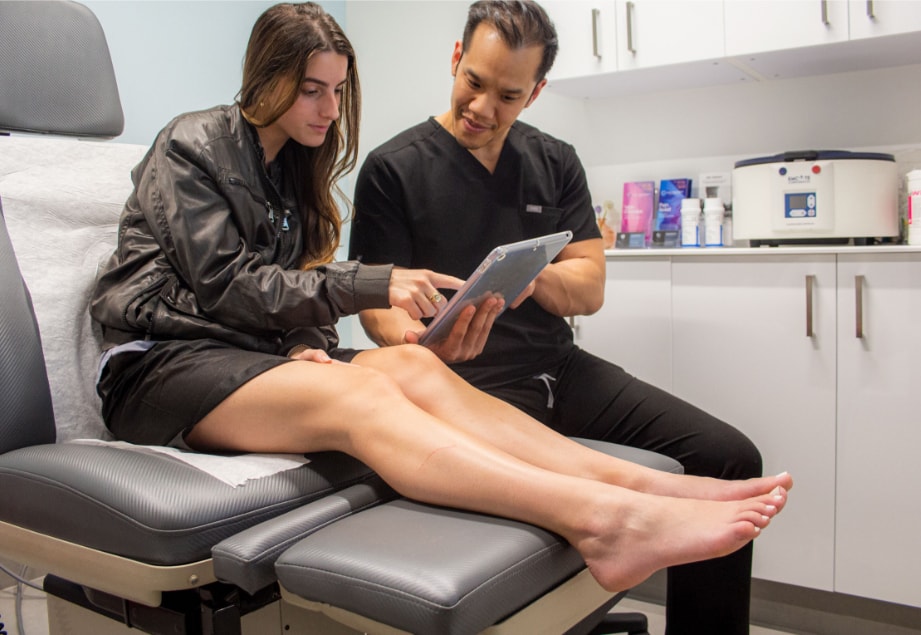
Diagnosing Leg Swelling
If you are experiencing leg swelling, we recommend scheduling an appointment with a board-certified vein doctor. We will perform a physical exam and ask about your medical history and any medications you are taking. We may also order imaging tests, such as a duplex ultrasound, to help diagnose the underlying cause of your leg swelling.
Treating Leg Swelling
Treatment for leg swelling depends on the underlying cause. At New York Vein Treatment, we offer minimally invasive spider vein and varicose vein treatments, such as sclerotherapy, endovenous laser ablation, radiofrequency ablation, VenaSeal, and ambulatory phlebectomy. These treatments are performed on an outpatient basis and require little to no downtime.

BOOK AN APPOINTMENT
Experiencing symptoms of vein disease? Book an appointment with one of the our Vein Specialists in New York.
Your information is encrypted and secure. By registering you confirm that you accept Terms and Conditions and Privacy Policy
Visit New York Vein Treatment
Leg swelling can be a normal occurrence, but it can also indicate a more serious underlying condition. If you are experiencing leg swelling, it is important to pay attention to any accompanying symptoms and seek medical attention if necessary. At New York Vein Treatment, we offer personalized treatment plans for leg swelling based on the underlying cause. Our board-certified vein doctors use minimally invasive techniques to treat spider veins and varicose veins with little to no downtime.
Our two convenient locations in Midtown Manhattan and the Financial District make it easy to access high-quality vein care. Our Midtown Manhattan location is located at 290 Madison Ave Suite 202, opposite to Grand Central Station and Penn Station. Our Financial District location is located at 156 William St, 3rd Floor, New York, close to the 9/11 Tribute Museum, New York Stock Exchange, and The Seaport. Please schedule an appointment at your nearest medical center for vein treatment in New York.
MEET OUR NEW YORK
VEIN SPECIALISTS
Dr.MICHAEL NGUYEN
Veins Specialist NYC
He leads the team of vein doctors offering the highest level of care at our Spider and Varicose Vein Treatment Center NYC.
HARVARD MEDICAL SCHOOL
Dr. JUAN D. MONTOYA
Veins Specialists NYC
Highly sought after for his expertise and excellent outcomes in Vein Treatments in Manhattan.
YALE MEDICAL SCHOOL
Dr. SAREH RAJAEE
Veins Specialists NYC
She has extensive experience with vein performing procedures based on New York City.
HARVARD MEDICAL SCHOOL
Learn more about our clinics, doctors and procedures!



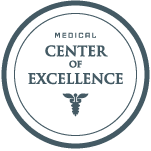



Contact us
Call us
Speak instantly with one of our team members; they will answer any questions you may have regarding insurance coverage, booking an appointment and our vein treatment locations. (646) 859-1833
Book online
Visit our Book Appointment page and instantly request an appointment at the New York vein center near you. We offer Free Insurance Verification before your appointment.
Get directions
Learn how to easily get to the New York vein center.
FEATURED POSTS BY VEIN DOCTORS
Get the Results You Want with Our Vein Treatments
Get the Results You Want with Our Vein Treatments If you're dealing with varicose veins or spider veins, you're not alone. Fortunately, New York Vein Treatment is here to help you achieve the results you want with our minimally invasive vein treatments. Led by...
Sclerotherapy: Spider Vein Treatment That Works
Sclerotherapy: Spider Vein Treatment That Works Are you tired of those unsightly spider veins that seem to appear out of nowhere on your legs, making you self-conscious about wearing shorts or skirts? Spider veins, those small, red, blue, or purple veins that often...
Varicose Vein Treatment Without Surgery: Benefits, Options, and Process
Varicose Vein Treatment Without Surgery: Benefits, Options, and ProcessIf you're dealing with varicose veins, you're not alone. Varicose veins are swollen, twisted veins that often appear blue or purple. They most commonly occur in the legs and are the result of...
The Best Vein Treatment in New York City
The Best Vein Treatment in New York City If you're dealing with the discomfort and unsightly appearance of varicose and spider veins, you're not alone. Millions of people in New York City and around the world are affected by these vein issues. Let's explore the best...




